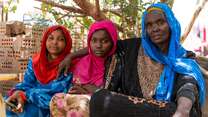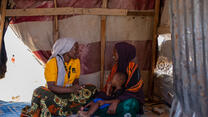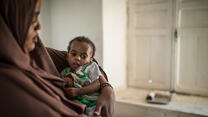Routine immunizations protect individuals, communities, countries, and even the world from outbreaks of deadly diseases and pandemics. While global immunization coverage has increased dramatically in the past two decades, this is driven largely by gains in stable contexts. Children in humanitarian settings, including conflict-affected, remote regions, and cross-border communities continue to disproportionately lack access to this foundational health service.
The ongoing and overlapping challenges of sustained conflict, food insecurity and other emergencies, porous borders, and limited health infrastructure have contributed to the persistent coverage gap in vaccination. To overcome this, we need to innovative. Each barrier to vaccination in the Horn requires unique interventions to deliver immunizations at scale and close the dangerous vaccination gap.
The IRC-led REACH Consortium, funded by Gavi, the Vaccine Alliance, was designed to address this challenge—to close the immunization gap in Ethiopia, Somalia, South Sudan, and Sudan. Powered by a network of global and local partners, the REACH Consortium works to extend services to those beyond the reach of government systems and ensure that no child, wherever they live, is left behind.
At the start of the project, the REACH Consortium conducted a first-of-its-kind mapping of the population of zero-dose children to identify coverage caps and contextual barriers. In REACH’s operating areas, the IRC and partners estimate that among a total population of 2.23million children under five identified, 1.23 million (54.9%) qualify as zero-dose. Another 420,000 children (- 18.6%) qualify as under-immunized. Based on the population data and the reach of existing government vaccination efforts, 156 districts in Ethiopia, Somalia, South Sudan, and Sudan were selected for implementation. These districts include conflict settings, regions under partial or no government control, and regions with large populations of IDPs, refugees, and nomadic communities.
To reach these children with immunization services, the REACH Consortium has enacted innovative strategies including identifying sites for fixed, static, and mobile vaccination sessions; building capacity of vaccination workforce (vaccinators, mobilizers) to deliver quality immunization services and sustained community level mobilization (demand creation); and working towards establishing last mile supply chain (vaccine and cold chain equipment access) within REACH locations to ensure availability of vaccines and minimize missed opportunities to vaccinate due to breaks in supply chains. In the first 6 months of the project’s implementation phase, the Gavi Reach Consortium has delivered routine immunizations (DPT and MCV) to 298,559 children in Somalia, Ethiopia, Sudan and South Sudan.
Read the Project Brief to learn more about how the REACH Consortium is using innovative methods to reach zero-dose and under-immunized children.



